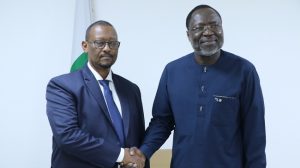Low agricultural productivity, food and nutritional insecurity and availing smallholder farmers access to life-changing technologies are issues that AATF and ECOWAS have agreed to solve in partnership in the West African sub-region.

Leaders of the two organisations met in Abuja on May 15, 2023, to discuss modalities of ensuring the sub-region is food and nutrition secure.
This follows ECOWAS recent alarm stating that over 107 million people in the region are experiencing nutrition and food insecurity and require urgent intervention.
During the meeting, Dr Canisius Kanangire, AATF’s Executive Director, said AATF has been able to demonstrate that with technologies, Africa can change the narratives which tag the continent as hungry and poor.
“AATF is focused on empowering smallholder farmers across sub-Saharan Africa with agricultural innovations that can generate wealth and health for their families with all communities and countries benefitting as well,” Dr Kanangire said.
“AATF is seeking a sustainable partnership with ECOWAS to help farmers in the region become globally competitive through technology,” Dr Kanangire added.
The Executive Director used the opportunity to brief the ECOWAS Commission leadership on the strides attained by AATF in the last decade.
It includes an active presence in 24 African countries, provision of technological access to reaching 4.8 million farmers while other interventions include the engagement of 47.3 million stakeholders through advocacy, outreach and regulatory support.
Within this period, Dr Kanangire explained that the Foundation was able to produce for farmers over 30,000 metric tons of seeds from its commercialisation programmes with 178,000 farmers accessing seed markets while 150 seed companies benefited from AATF-led capacity enhancement programmes.
He urged ECOWAS to consider a quick harmonisation of key policies and laws to enable the free movement of acceptable technologies across the sub-region which will allow farmers to maximise the benefits of technologies for enhanced productivity.
Receiving the AATF team, Dr Omar Alieu Touray, President of the ECOWAS Commission, said that the Commission was working with various organisations to improve agricultural productivity in the sub-region.
“When I visited the scientists and experts, we were convinced we cannot be persuading ourselves, we need politicians, NGOs, farmers’ organisations, and other bodies to tell them the possibilities to be attained with technologies in the agricultural sector,” Dr Touray said.
He called for the exploration of low-hanging fruits by both organisations to seek quick solutions to the mir challenges confronting agriculture, farmers and citizens of the region.
In a related development, former Director General of the National Biosafety Management Agency (NBMA), Dr Rufus Ebegba, has said that his position as Nigeria’s chief biosafety regulator was due to opportunities facilitated by AATF.
“As a young biosafety officer, in the Federal Ministry of Environment, AATF facilitated my participation in a three-month course in Australia and this opened my eyes to the endless opportunities biotechnology offers and also the need to strictly monitor its development for the safety of humans and the environment,” Dr Ebegba said at an interaction with AATF leadership in Abuja.
Dr Kanangire held an interactive session with Dr Ebegba who stepped down from his pioneering position as the Director-General of NBMA after eight years of meritorious service.
Dr Ebegba noted that Africa can make the best use of biosafety regulation to ensure a food and nutrition-secure continent if more emphasis is placed on capacity development.
He emphasised that “with proper education, continuous training and a conducive atmosphere for learning, Africa can effectively regulate modern biotechnology and guarantee the safety of humans, animals and the environment.”
Earlier, Dr Kanangire expressed profound gratitude from AATF board and management for Dr Ebegba’s leadership in biosafety matters in Africa and particularly Nigeria. He noted that Dr Ebegba was able to build a monumental biosafety system for Nigeria which now serves as a reference point for other African countries.
He said that under Dr Ebegba NBMA made significant strides in regulating safe handling and use of genetically modified organisms (GMOs) in Nigeria. and His passion and expertise were instrumental in ensuring the success of biosafety regulations in protecting the environment, biodiversity and human health.
“You have been a true visionary in your field, constantly striving to improve biosafety regulations and standards in Nigeria. Your unwavering commitment to protecting Nigeria’s natural resources and promoting sustainable development has been an inspiration to many, Dr Kanangire said.
He stressed that “it is rare to find someone like you who combines expertise, dedication, and compassion making you a great leader, mentor and role model to those who have had the privilege of working with you”.
